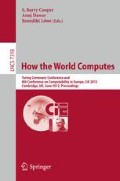Abstract
We initiate a study of languages of partial words related to regular languages of full words. First, we study the possibility of expressing a regular language of full words as the image of a partial-words-language through a substitution that only replaces the hole symbols of the partial words with a finite set of letters. Results regarding the structure, uniqueness and succinctness of such a representation, as well as a series of related decidability and computational-hardness results, are presented. Finally, we define a hierarchy of classes of languages of partial words, by grouping together languages that can be connected in strong ways to regular languages, and derive their closure properties.
Access this chapter
Tax calculation will be finalised at checkout
Purchases are for personal use only
Preview
Unable to display preview. Download preview PDF.
References
Berstel, J., Boasson, L.: Partial words and a theorem of Fine and Wilf. Theoretical Computer Science 218, 135–141 (1999)
Blanchet-Sadri, F.: Algorithmic Combinatorics on Partial Words. Chapman & Hall/CRC Press (2008)
Fischer, M.J., Paterson, M.S.: String matching and other products. In: Complexity of Computation, Proceedings of SIAM-AMS, vol. 7, pp. 113–125 (1974)
Lischke, G.: Restoration of punctured languages and similarity of languages. Mathematical Logic Quarterly 52(1), 20–28 (2006)
Manea, F., Mercaş, R.: Freeness of partial words. Theoretical Computer Science 389(1-2), 265–277 (2007)
Manea, F., Tiseanu, C.: Hard Counting Problems for Partial Words. In: Dediu, A.-H., Fernau, H., Martín-Vide, C. (eds.) LATA 2010. LNCS, vol. 6031, pp. 426–438. Springer, Heidelberg (2010)
Rozenberg, G., Salomaa, A.: Handbook of Formal Languages. Springer-Verlag New York, Inc., Secaucus (1997)
Author information
Authors and Affiliations
Editor information
Editors and Affiliations
Rights and permissions
Copyright information
© 2012 Springer-Verlag Berlin Heidelberg
About this paper
Cite this paper
Dassow, J., Manea, F., Mercaş, R. (2012). Connecting Partial Words and Regular Languages. In: Cooper, S.B., Dawar, A., Löwe, B. (eds) How the World Computes. CiE 2012. Lecture Notes in Computer Science, vol 7318. Springer, Berlin, Heidelberg. https://doi.org/10.1007/978-3-642-30870-3_16
Download citation
DOI: https://doi.org/10.1007/978-3-642-30870-3_16
Publisher Name: Springer, Berlin, Heidelberg
Print ISBN: 978-3-642-30869-7
Online ISBN: 978-3-642-30870-3
eBook Packages: Computer ScienceComputer Science (R0)

